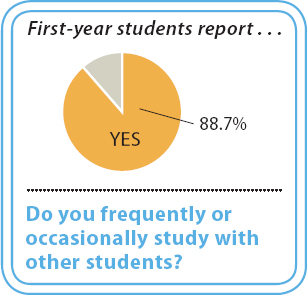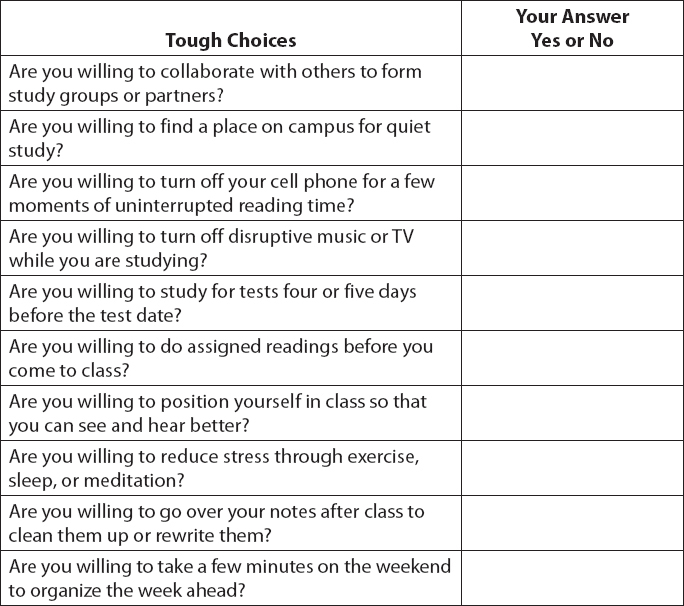Study to Understand and Remember
YOUR TURN
Write and Reflect
The next time that you are reading a textbook, monitor your ability to concentrate. Check your watch when you begin and check it again when your mind begins to wander. How many minutes did you concentrate on your reading? List some strategies to keep your mind from wandering. Write down in a journal entry ideas you have heard that you think will work well for you.
Studying will help you accomplish two goals: understanding and remembering. Although memory is a necessary tool for learning, what’s most important is that you study to develop a deep understanding of course information. When you truly comprehend what you are learning, you will be able to place names, dates, and specific facts in context. You will also be able to exercise your critical-thinking abilities.
The human mind has discovered ingenious ways to understand and remember information. Here are some methods that might be useful to you as you’re trying to nail down the causes of World War I, remember the steps in a chemistry problem, or absorb a mathematical formula:
- Pay attention to what you’re hearing or reading. This suggestion is perhaps the most basic and the most important. If you’re sitting in class thinking about everything except what the professor is saying or if you’re reading and find that your mind is wandering, you’re wasting your time. Force yourself to focus. Complete the exercise in Figure 8.1 to determine how willing you are to increase your concentration when you study.
- “Overlearn” the material. After you know and think that you understand the material you’re studying, go over it again to make sure that you’ll retain it for a long time. Test yourself or ask someone else to test you. Recite out loud, in your own words, what you’re trying to remember. Explain it to another person.
YOUR TURN
Work Together
Share in a small group your thoughts on whether you think that it is important to be organized. How would you describe your living space and your “electronic environment”? Today, when you return to your room, pay attention to your living or studying environment.
- Check the Internet. If you’re having trouble remembering what you have learned, search a key word and try to find interesting details that will engage you in learning more, not less, about the subject. For instance, if you are taking an introductory course in psychology, you might want to investigate “controversial issues in psychology” to see where the experts disagree. Many first-year courses cover such a large amount of material that you’ll miss the more interesting details unless you seek them out for yourself. As your interest increases, so will your memory for the topic.
- Be sure that you have the big picture. Whenever you begin a course, make sure that you’re clear on what the course will cover. You can talk with someone who has already taken the course, or you can take a brief look at all the reading assignments. Having the big picture will help you understand and remember the details of what you’re learning. For instance, the big picture in this first-year class is to give students the knowledge (e.g., ways to identify the kind of learner you are, the role of critical thinking in lifetime learning) and strategies (e.g., how to manage time, how to take effective notes) to be successful in college. Review the syllabus for this course and think about what might be missing. Are there topics related to college success that this course doesn’t seem to cover?
- Look for connections between your life and what’s going on in your courses. College courses might seem irrelevant to you, but if you look more carefully, you’ll find many connections between course material and your daily life. Seeing those connections will make your courses more interesting and will help you remember what you’re learning. For example, if you’re taking a music theory course and studying chord patterns, listen for those patterns in contemporary music.

- Get organized. If your desk or your computer is organized, you’ll spend less time trying to remember a file name or where you put a particular document. Also, as you rewrite your notes, the process of putting them in a logical order (either chronological or thematic) that makes sense to you will help you learn and remember them.
- Reduce stressors in your life. Although there’s no way to determine the extent to which worry or stress causes you to be unable to focus or to forget, most people will agree that stress can be a distraction. Healthy, stress-reducing behaviors such as meditation, exercise, and sleep are especially important for college students. Many campuses have counseling or health centers that can provide resources to help you deal with whatever might be causing stress in your daily life.
- Collaborate with others. One of the most effective ways to study is in a group with other students. In your first year of college, gather a group of students who study together. Study groups can meet throughout the term or can review for midterm or final exams.

Making these changes in behavior now will save you a lot of headaches in the future. Attending college is a huge responsibility, one that should not be taken lightly. As a mature learner, you need to be flexible and change your old patterns to create successful new habits. Making tough choices isn’t easy, but it will directly impact your ability to remember and retain the information you will be required to learn in the months and years ahead.
